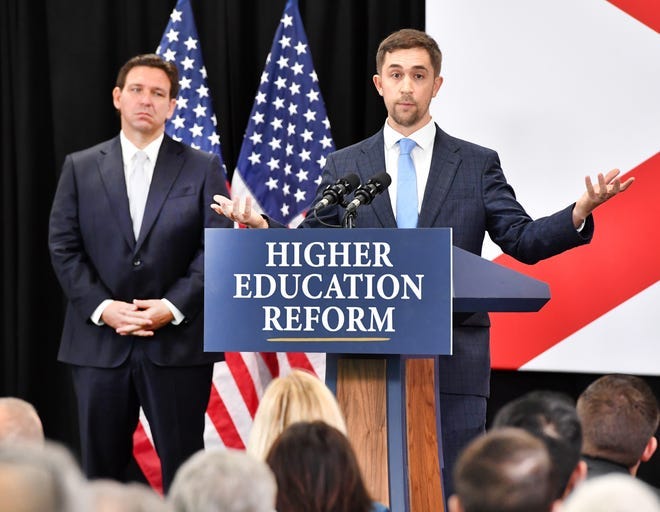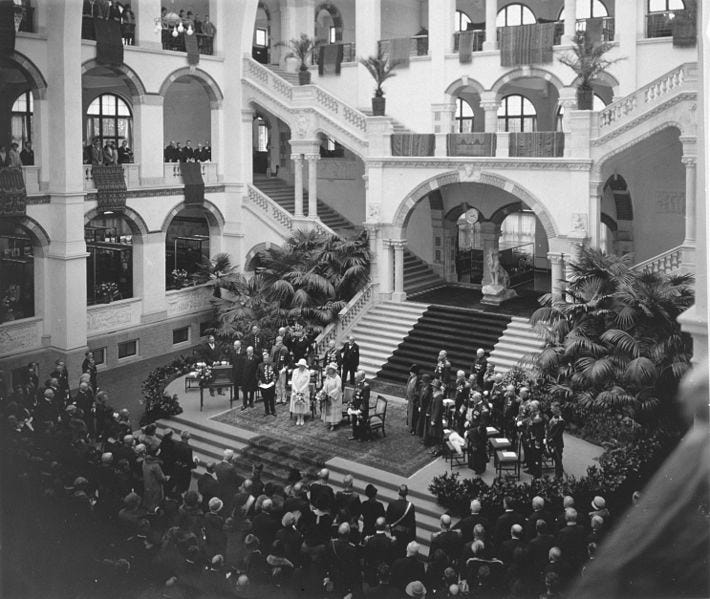Mainstreaming Neocolonialist Thought
For a movement allegedly focused on putting “America First,” why is the Trump/Jacksonian right so enamored with neocolonialism?
For a movement allegedly focused on putting “America First,” the Trump-Jacksonian side of the aisle has what can only be properly construed as an unusual attraction to neocolonialism. Particularly of late. Of course, the most obvious example of this strange juxtaposition in practice is the former President’s dealings with the Netanyahu government, despite his personal revulsion to the man. Or, to be more accurate, the former President’s exclusion of representatives of the Palestinian people, who happen to be brown, in any serious peace talks during his administration. How does the much hoped for Palestinian state materialize when the Trumpists essentially side with Israel on all contentious regional issues?
In fine: How does an administration say neocolonialism without saying neocolonialism? “But this overall approach essentially kicked the Palestinians and their grievances (the Israeli occupation of the West Bank, its apartheid policies, and its blockade of Gaza, which turned the strip, according to Human Rights Watch, into an ‘open-air prison’) to the curb,” David Corn wrote in Mother Jones of the Trump approach to the Middle East. “This justifiably angered Palestinians.” I would imagine so …
Further, the Netanyahu regime appears to be playing a waiting game as the American Presidential campaign lurches forward. And why not from the point of view of Bibi? In an article titled “Trump Was Good For Netanyahu. Biden Will Be Good For Israel,” Aaron David Miller notes:
“In 2018, visiting the White House shortly after Trump had officially recognized Jerusalem as Israel’s capital, Netanyahu praised the president and placed him in the same pantheon as other historic benefactors of the Jewish people — Cyrus the Great, Lord Balfour and Harry S. Truman. On the surface, one can see why. The president’s son-in-law and White House adviser, Jared Kushner, told me a year earlier that Trump would create such a close bond with Netanyahu that the prime minister would never say no if Trump wanted anything in return. Whatever Netanyahu wanted, Trump seemed to oblige him.
And oblige him he did, from the get-go. One of Trump’s first appointments as President was David Friedman, a hardliner, as his first Ambassador to Israel. Friedman was Trump’s personal bankruptcy lawyer as well as a settler financier with longstanding ties to Beit El settlement in the West Bank. Blocking a former Palestinian Prime Minister from a diplomatic position at the UN for no reason whatsoever? The recognition of Jerusalem as Israel’s capital? The recognition of Israeli sovereignty over the Golan Heights? The defunding of the Palestinian territories?
Prime Minister Netanyahu has run-the-clock before with regards to American Presidents — particularly Democrats — gambling that a change in administrations could be to his benefit, even going so far, as in the case of Mitt Romney, to all but campaign on behalf of the GOP. Israel’s far-right National Security Minister Itamar Ben-Gvir has said as much publicly, regarding the waiting game. “Instead of giving us his full backing, Biden is busy with giving humanitarian aid and fuel [to Gaza], which goes to Hamas,” Ben-Gvir said last month in his first interview as a government official. “If [former President Donald] Trump was in power, the US conduct would be completely different," Ben-Gvir told the Wall Street Journal.
Charmed, I’m sure.
But back to the mainstreaming of neocolonialism, from which we are veering. This time at Florida’s New College, once an experimental academic powerhouse, now a shadow of its former self since its overhaul by culture-warrior and former Presidential candidate Governor Ron DeSantis. We won’t entertain the possibility that the changes at New School are naught else but performative anti-wokeness.

As a continuance of those theatrics, which failed so spectacularly on the campaign trail, next year, Bruce Gilley, a Portland State University professor, is heading to the New College of Florida as a Presidential Scholar in Residence. Six years ago, Gilley published a scurrilous little essay called “The Case for Colonialism” in the journal Third World Quarterly. As a result of this intellectual pollution, fifteen members of the journal’s thirty-four-member editorial board. A petition with more than 10,000 names was filed calling for the retraction of the article and an apology. “We do not call for the curtailing of the writer's freedom of speech … Our goal is to raise academic publishing standards and integrity,” is how they phrased it.
There is so much wrong about this exercise in pseudo-academic clickbait, including the claim that colonialism was “objectively beneficial,” that it is hard to know where to begin. Or whether to actually take it seriously as more than just “clickbait with footnotes,” as it has been described. But then, perhaps its willful blindness to vast sections of colonial history is the purpose of an “anti-woke” college degree, making Gilley something of an avatar of an old-but-new again social science and literature that depresses the worldview of peoples of color. To which, Sahar Khan at the right-of-center Cato Institute refutes one of the many faulty theses of the essay by writing:
Gilley describes anti‐colonial literature’s emphasis on the harmful effects of colonization as biased, inadequate, and not thorough enough. However, he ignores how disproportionate the benefits of colonialism were toward colonized populations. It is true that during their colonial rule, the British, French, Portuguese, Spanish, and Dutch built railways, expanded education systems, improved healthcare, created systems of taxation, and outlined basic governance infrastructure. And so Gilley states that a colonial governance agenda “resurrects the universalism of the liberal peace and with it a shared standard of what a well‐governed country looks like” (p. 8). He uses Alexander De Juan and Jan Henryk Pierskalla’s article to make this point against anti‐colonial critiques. De Juan and Pierskalla’s article, however, does not advance a pro‐colonial agenda. Instead, it is a literature review showcasing four areas for growth within interdisciplinary postcolonial scholarship that include internal dynamics of colonial rule, disaggregating variables and units of analyses, and investigating contexts that shaped the consequences of colonial rule. Furthermore, advancements under colonial rule were not for everyone; not only did these measures favor elites and pro‐colonizer groups but also created divisions along ethnic, religious, and linguistic lines within indigenous populations that continue to exist today.
But why should careful scholarship or even the empirical evidence interfere with anti-wokeness performance art? And so Gilley gets a reward and a promotion, from associate Professor at Portland State to Presidential Scholar at New College. He was even trotted out before the German parliament, the Bundestag, to give a “lecture.” Gilley is the Sir Edmund Hillary of academic climbers! But to what teleological endpoint lie these ideological sympathies? This mainstreamed colonialism? Certainly not the 19th century, where colonialist sympathies properly belong but stubbornly, stubbornly refuse to remain.
The final — and worst incidence — of the mainstreaming of neocolonialist thought on the far-right comes from the mercenary, Erik Prince, shadow advisor to President Trump. Last month Prince, the brother of Trump’s Education Secretary Betsy DeVos, told the accurately titled “Off Leash” podcast:
If so many of these countries around the world are incapable of governing themselves, it’s time for us to just put the imperial hat back on, to say, we’re going to govern those countries … ’cause enough is enough, we’re done being invaded. …
You can say that about pretty much all of Africa, they’re incapable of governing themselves.
The white man’s burden! Prince added, impolitically, that colonialism would be a great idea for Latin America as well. “Absolutely, yes. Enough. Because if you go to these countries [then] you see how they suffer under absolutely corrupt made-up governments that are just criminal syndicates,” he said. “The people of Africa and the people of Latin America deserve better.” Because Erik Prince cares about the lives of brown people.
In recent polls there has been some shifting of African-American and Latino men from Biden to Trump. At least in polls. It is not a large number, but it is significant, considering that this will probably be another close election rematch. Trump is going to lose a certain amount of suburban women this time — as a result of his trials, the sexual abuse verdict in the E. Jean Carroll case and the boasting of his Supreme Court picks overturning Roe v Wade — so he needs to shift some voters of color, particularly men, that identify as working class, in his direction.
What would those potential voters — men of color, who are immigrants or the children or grandchildren of immigrants from Latin America and Africa — think about his movement’s mainstreaming of such a crude and putrid form of neocolonialism?
“The number of Africans entering Britain as care workers nearly trebled over the last year after visa rules were changed to tackle staff shortages exposed by the COVID-19 pandemic and Brexit. It highlights the West’s growing reliance on migrants from the world’s youngest continent to care for its aging populations. Africans now make up the majority of foreigners given the right to work in Britain’s care system. Some 57,000 Africans entered the country on a Health and Care visa in 2023 — up from just over 20,000 in 2022 and more than half of the approximately 106,000 granted the right to travel to Britain for that work, Semafor Africa’s analysis of newly released Home Office data shows. Britain’s government in December 2021 added care staff to a list of occupations for which visas would be granted to address a shortage of workers which rose sharply during the pandemic.” (Alexis Akwagyiram/semafor)
“The potential for a Ukrainian counteroffensive in 2024 has been openly discussed by the Ukrainian President Volodymyr Zelenskyy, as well as by the commander of the Ukrainian ground forces Lieutenant General Oleksandr Pavlyuk. Zelenskyy referred to Ukrainian plans for a 2024 counteroffensive in a late February interview, noting: ‘We will prepare a new counteroffensive, a new operation.’ More recently, General Pavlyuk described how Ukraine would rotate frontline forces in the near future and, in doing so, create a new group of forces to conduct ‘counteroffensive actions.’ To plan, prepare for and execute a large-scale counteroffensive in 2024 will be an enormous undertaking for Ukraine. There are three key challenges. First, Ukraine has a shortage of personnel in its military. The shortages in frontline soldiers are most acute, and this has contributed to the Russians being able to slowly advance in the east and the south over the past couple of months. Without a resolution to this problem, which would necessitate a wider mobilisation of people in Ukraine, building a reserve of ground forces for offensive actions will be very difficult. A second challenge is the shortage in firepower.” (Mick Ryan)
“Anna Wolfe graduated from Mississippi State University in 2014. She is now the ‘inequity and corruption’ reporter for Mississippi Today, a nonprofit that in less than a decade has earned recognition as the state’s leading news organization. Wolfe’s coverage of Mississippi’s welfare program won last year’s Pulitzer Prize for Local Reporting. The citation said that she ‘revealed how a former Mississippi governor used his office to steer millions of state welfare dollars to benefit his family and friends, including NFL quarterback Brett Favre.’ Wolfe has accumulated so many other top-tier accolades for her work that linking to them here shows the measure of her accomplishments. Yes, local journalism around the country has been ravaged by business upheavals. But Wolfe and her colleagues in Mississippi and their counterparts at scores of other startup nonprofit news enterprises around the country are reinventing the essential practice of keeping tabs on who, what, when where and how all that matters to so many people happens and what it means to them.” (Peter Osnos)



